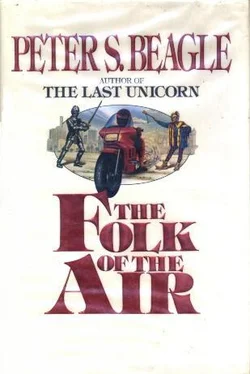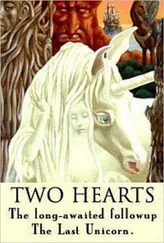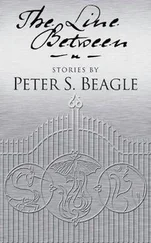Julie said, “May it please your Majesty, behold, I have brought for your pleasure the flower of lute players, the true nonesuch of Huy Braseal.” Farrell blushed, which surprised him very much. He began to explain about his geas, but Julie interrupted and did it for him, speaking the moonshine English as trippingly as if she had been born to it. The king watched her with grudging admiration.
“Damn castle talk wears me out,” he complained loudly, wheezing nut-brown ale all over Farrell. “I call it castle talk because you can’t call it a damn language, it doesn’t have any rules . Just so it sounds like Prince Valiant would have said it. Pitiful, you know?”
The red Tudor cleared his throat again. “Sire, my liege, will’t please you join the Queen? She waiteth upon you even now, for to lead the galliard.” He had a high, toneless voice and deepset eyes like pearls.
“Castle talk,” King Bohemond said. “MGM talk, Classic Comics talk—Walter Scott, for God’s sake, it’s all bits and snatches of Scott, anyway.” His voice rose, turning sadly spiteful. “Of course, it doesn’t matter to them . They aren’t in ethnolinguistics, they don’t feel the slightest responsibility to language. I mean, fuck syntax, fuck morphology, right? Hey, whatever feels good.”
He spread his arms wide, striking an attitude of grinning, mindless benevolence. His crown fell off, and Farrell bent to pick it up. “Your Majesty, the Emperor Sigismund may have meant only—”
King Bohemond said, “Nobody is above grammar. I mean, that’s like being above digestion, right?” He grinned messily at Farrell, jabbing a companionable elbow into his side. “See, I’m embarrassing them, look at them.” He glowered around him at the amused noble lords and damsels who came drifting up over the grass in their tights and mantles and gently eddying gowns. “Nobody ever expected me to come out of nowhere. They pass that crown back and forth like a fucking basketball. I was not expected. So now they’re stuck with this goddamn peasant, this peasant king. Because, of course, nobody ever volunteers to be a peasant, some poor, ignorant, shitkicking serf, they use him for the fifty-yard line in their goddamn tournaments. So the king has to do it, the king has to represent the masses. Whole new tradition around here.”
A harshly handsome young woman, taller than he, was abruptly at his side, whispering grimly to him as she rubbed with a wet finger at a stain on his alba camisia . King Bohemond wriggled away from her, mumbling, “A people’s king,” but she moved with him, straightening his crown and tucking the trailing ends of his stole back into his girdle.
Julie murmured in Farrell’s ear, “Queen Leonora.”
“I believe it,” Farrell said.
King Bohemond broke loose again and inquired of Farrell with a sudden surprising dignity, “Th’art a musicker, sayest? Play an air for us, then, that we may know thee. For the reeds and the strings say who we are, beyond all misconceiving, and were each of us a man of music, there would be no more falsehood nor treachery in the world, surely.”
Farrell heard the black Saracen purr, “Nor no more marrying, neither.” His voice was a strange voice, soft and rough at once, sounding just at Farrell’s back, though he was standing nowhere near.
One of the musicians provided a lute, another a drum for a footstool. Farrell tuned the lute slowly, looking around the clearing. Among the gathering faces he saw the Lady Criseyde and Duke Frederik standing quietly together, while three children dressed as greenwood ragamuffins—the eldest could not have been twelve—perched stolidly on one another’s shoulders to see him. Julie had pointed them out, saying that they did tumbling, juggling and tightrope-walking at all the fairs. The Countess Elizabeth Bathory watched from the musicians’ dais, regarding Farrell with pudgy, cheerful voraciousness. Crof Grant, a snowplow in saffron, came cleaving his way through to the front, nodding and beaming upon the laird-haunted air, smiling forgivingly at those who hadn’t jumped aside in time. He finally caromed off Garth de Montfaucon and stalled just behind Queen Leonora.
Farell said, “Your Majesties. My lords and ladies all. Attend, I pray you, to a canso of the great troubadour Pierol, who was so sad in love so long ago.” He began to play a pattering, spidery prelude, retarding gradually after a few bars to a supple three-quarter time, barely emphasized. He sang in French, knowing better than to attempt the Provençal.
“ Bien des gens, hélas, me blament
De chanter si rarement .
La douleur fletrit mon ame .
Et mon coeur est en tourment .
Pourrais-je donc chanter galment ,
Quand il taut que je proclame
Que m’afflige durement
L’amour que j’ai pour ma dame ?“
The lute was less responsive than his own, and the song’s pitch was uncomfortable for his voice. He modulated into a different key, taking refuge in modern harmonies, ad-libbing a pattern of octaves over a completely anachronistic moving bass line. Wes Montgomery goes to the Crusades . But all such awareness seemed to be sliding rustily away from him like a railroad station as he played and sang a complaint eight hundred years old to fire-striped faces framed and lighted by the tall collars of cloaks, balanced between ruffles and plumes.
“ Dans un deuil amer me plonge
Sa cruauté sans recours .
C’est grand mal: un doux mensonge
Me serait d’un tel secours .“
Even one sweet lie would have rescued me from this torment . A switchblade flick of a grin passed between Garth de Montfaucon and the red Tudor; but the Lady Criseyde hugged her husband’s arm against her, and the green eyes of the Countess Elizabeth Bathory went round and thoughtful. The tall mercenary captain called Simon Widefarer scratched his grizzled bare chest and smiled; the thick, rumpled Sir William the Dubious fussed with his sagging hose; the black Saracen patted his fingertips together soundlessly. Farrell looked for Julie and sang the last lines to her, as Pierol or his jongleur might have sought out one waiting fire-striped glance in the cold, sooty hall.
“ Alors que pleure nuit et jour ,
Et ne vois pas, méme en songe ,
De remède a cet amour
Que mon coeur tenaille et ronge ,
Que mon coeur tenaille et ronge .”
The lute pinged into silence on an unresolved chord, leaving Pierol’s formal sorrow wandering in the night. And I see no help, even in dreams, for this love which claws and devours my heart . Farrell bowed deeply to King Bohemond and Queen Leonora.
He thought he had done well enough, for someone faking it in the wrong key; but when he heard the rustling and raised his head to see them all bowing to him, as they did for musicians—the gowns and cloaks sweeping down like wind-driven rain, the jeweled chains and girdles glinting like rain in the moonlight—then suddenly he found that he was shivering painfully with tenderness and excitement and fear.
The king said gruffly, “Come, pipe a tune to dance to, lad.”
Farrell retuned the lute and struck into A L’Entrade . Somewhere far away the choice astonished him considerably: he had never been able to domesticate that rowdy estam pie into a proper concert number and he could not remember the last time he had even practiced it. But his sweating hands took over, attacking the piece as savagely and sloppily as the troubadours’ dung-booted patrons had gone at their meals. The strings buzzed, cawed, whined, twangled, and the music lunged up singing with outrageous exultancy to welcome a twelfth-century spring and make wild, heartless mock of jealousy and old age. Begone, begone far from here! Let us dance, let us dance joyously all together, eya !
Читать дальше












